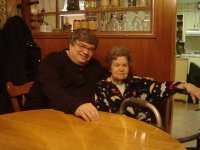 Evelyn Teachout, my mother, turned eighty today. As soon as I realized that my out-of-town reviewing schedule would make it all but impossible for me to be in Smalltown, U.S.A., for her birthday, I arranged instead to spend a week there in May between trips to Texas and Washington, D.C. I figured that she’d rather have me at home for several days in a row than have me parachute into Smalltown for the Big Day and leave in haste a few scant hours later. I figured right–Mom preferred the first option–but I still felt a pang when I woke up this morning and knew that I wouldn’t be present in person to pay tribute to the woman who made me what I am.
Evelyn Teachout, my mother, turned eighty today. As soon as I realized that my out-of-town reviewing schedule would make it all but impossible for me to be in Smalltown, U.S.A., for her birthday, I arranged instead to spend a week there in May between trips to Texas and Washington, D.C. I figured that she’d rather have me at home for several days in a row than have me parachute into Smalltown for the Big Day and leave in haste a few scant hours later. I figured right–Mom preferred the first option–but I still felt a pang when I woke up this morning and knew that I wouldn’t be present in person to pay tribute to the woman who made me what I am.
I’ve lived long enough to discover that many, perhaps most people have complicated and largely unsatisfactory relationships with their mothers. Not me. Mine is simple, straightforward, and profoundly gratifying. Sigmund Freud, who was right about a few things, wrote in “A Childhood Recollection of Dichtung und Wahrheit” that “if a man has been his mother’s undisputed darling he retains throughout life the triumphant feeling, the confidence in success, which not seldom brings actual success along with it.” This doesn’t quite apply to me–my mother has always loved my brother and me equally–but it’s true that from childhood onward, she left both of us in no doubt of her unconditional love. What’s more, she always gave the impression of taking it for granted that Dave and I could do anything to which we set our minds and hands.
Not that her confidence was oppressive: Mom also made it clear that whatever my brother and I ended up doing would be perfectly fine with her. As a result, she inspired us instead of crushing us, and the fact that she has lived long enough to see how the two of us turned out is one of the greatest joys of my middle age.
My mother has given me countless other gifts through the years, starting with the gift of a sense of humor. I was, she says, an earnest little boy who was disinclined to laugh at much of anything, and she worked overtime to teach me how to smile at the myriad absurdities of the world, a lesson that I like to think I learned well. I’m returning the favor half a lifetime later: I call Mom from wherever I am most nights, and every time I do so, I always do my best to make her laugh, usually with success.
Some debts are beyond repayment, but I tossed a penny on the scales when I wrote the last paragraph of Pops: A Life of Louis Armstrong:
Above all I thank my mother, who called me into the living room of our Missouri home one Sunday night and sat me down in front of the TV, on which Louis Armstrong was singing “Hello, Dolly!” on The Ed Sullivan Show. “This man won’t be around forever,” she said. “Someday you’ll be glad you saw him.” That was back when the public schools in my home town were still segregated, two decades after a black man had been dragged from our city jail, hauled through the streets at the end of a rope, and set afire. Yet even in a place where such a monstrous evil had been wrought, my mother came to love Armstrong–and, just as important, to respect him–not merely for the beauty of the music he made but also for the goodness of the man who made it. I wrote this book so that she, and others like her, might know more about the man they loved.
Mom hasn’t gotten that far in the advance reading copy of Pops that Houghton Mifflin Harcourt sent her a couple of weeks ago. “I put you on the last page,” I told her the other day, to which she replied, “Well, I’m not going to look. I’m going to save it until the end.” Nor will she see this posting: she doesn’t go in for computers. So now you know something she doesn’t, as well as something that I’ve told her many times: I think I have the best mother in the world. May she be around twenty years from now to hear me say it yet again!
